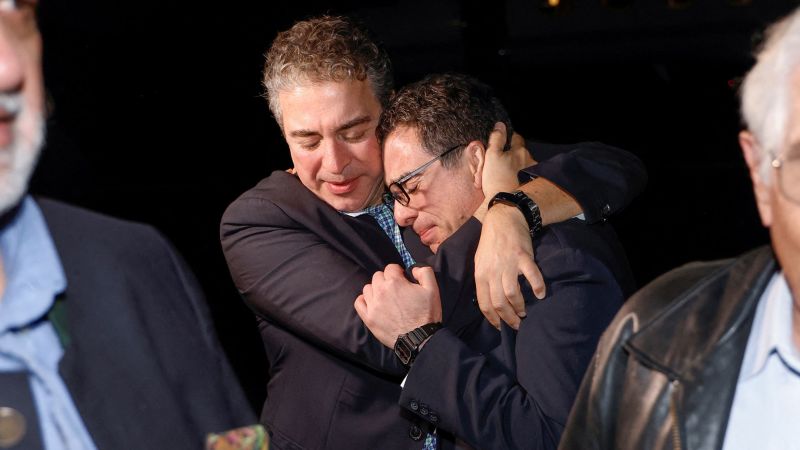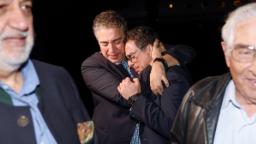

CNN
—
Five Americans freed from Iranian detention this week returned to US soil early Tuesday following an initial stop in Doha, Qatar, two US officials told CNN.
Emad Shargi, Morad Tahbaz and Siamak Namazi, along with two Americans who have not been publicly named arrived at Fort Belvoir’s Davison Army Airfield for an emotional reunion with their family members.
The freed Americans, who were released Monday as part of a wider deal that includes the US unfreezing $6 billion in Iranian funds, will have the option to participate in a Department of Defense program known as PISA (Post Isolation Support Activities) to help them acclimate back to normal life now that they are back in the United States.
The return of the five Americans, all of whom had been designated as wrongfully detained, caps a significant diplomatic breakthrough after years of complicated indirect negotiations between the US and Iran, who do not have formal diplomatic ties.
Special Presidential Envoy for Hostage Affairs Roger Carstens and Acting US special envoy for Iran Abram Paley descended the steps of the small plane first to cheers and applause, and someone was heard shouting, “Yay Roger! Yay Abram!”
Then the freed American detainees stepped off the plane and onto US soil for the first time in more than five years and into the arms of their loved ones, some of whom rushed forward to greet them, carrying small American flags.
“We’re home,” Emad Shargi said after embracing his daughters, Hannah and Ariana, and stroking his wife Bahareh’s face.
The family members then greeted each other’s returned loved ones – Bahareh hugging Siamak and Morad’s son hugging Emad.
“Families were hugging, crying, people at some points hadn’t seen each other in eight years. I had the chance to hug and talk to a few of them myself but also to watch the families interact. It was very nice to watch the Shargi family interact with the Tahbaz family, the Tahbaz family interact with the Namazi family,” Carstens said on “CNN This Morning” Tuesday. “These people have become quite close over the last few years. It was good to watch that energy and love and happiness and joy of watching this reconnection.”
“I think they’re doing great,” he said of the former hostages’ emotional state, adding that they are now in the care of the Department of Defense and undergoing post-isolation support activities.
In his first statement since his release from Iranian detention, Tahbaz said his “time in captivity was difficult but also helped me learn a lot about myself and the world.”
“Although I am a cancer survivor, I learned that I needed to be even stronger than I thought I was. I had to dig deep within myself to find the resilience to overcome this challenge,” he said in the statement shared with CNN Tuesday.
“However, I also learned that even in the darkest places and worst conditions, there are still good people in this world, and that gave me hope,” Tahbaz, who returned to the US along with his wife, Vida Tahbaz.
He noted that they “are still absorbing the enormity of coming back home and to freedom” and are “focused on our recovery and spending private time with our family as we adapt to a new normal.”
National security adviser Jake Sullivan posted on X an image of the Americans on the flight back to the US, along with a message that said, “Welcome home.”
The group was flown out of Tehran on a Qatari government jet to Doha on Monday, before taking off for the Washington, DC, area to be reunited with their families, according to a senior administration official. Namazi’s mother, Effie Namazi, and Vida Tahbaz, who had been previously unable to leave Iran, were also on the flight from Iran to Doha, the official said Monday.
After a year of indirect negotiations, the deal began to broadly come together in Doha about seven months ago and the first tangible public steps took place about five weeks ago, when four of the Americans were transferred to house arrest. The fifth American was already under house arrest.
President Joe Biden on Monday celebrated their release “after enduring years of agony, uncertainty, and suffering.” But while the release stood as the latest high-profile deal negotiated by his administration to secure the release of Americans deemed wrongly detained abroad, Biden drew criticism from some Republicans who likened the agreement to a “ransom payment.”
A senior Biden administration official said Monday that the deal “has not changed our relationship with Iran in any way,” noting the US would still work to hold Iran accountable for its human rights abuses and to constrain its nuclear program.
This story has been updated with additional information.
